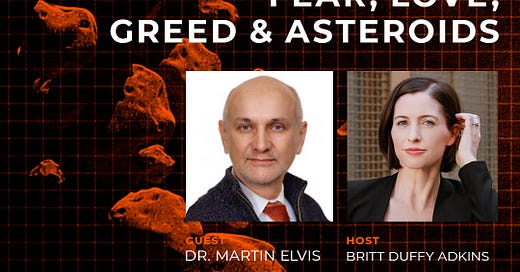Fear, Love, Greed & Asteroids
Celestial Citizen Season 4 Ep. 1 with Dr. Martin Elvis Available Now!
Welcome to another episode and another season of Celestial Citizen Podcast! Today, we will be discussing all things asteroids – especially fitting given the recent successful NASA DART (or Double Asteroid Redirection Test) mission toward the end of 2022. We’ll be speaking with astronomer Dr. Martin Elvis and diving into his book – Asteroids: How Love, Fear, and Greed Will Determine Our Future in Space – it’s a fascinating and informative read for anyone interested in learning more about how asteroids could influence the future of space exploration.
On today’s show we are joined by Dr. Martin Elvis.
Dr. Elvis is an astronomer at the Smithsonian Astrophysical Observatory which is a collaborative research effort alongside Harvard University and it is now known as the Center for Astrophysics. Dr. Elvis has obsessed for years over how supermassive black holes come to be seen as quasars, sources so bright that we see them out to the greatest distances and earliest times in the universe. For his PhD, Dr. Elvis discovered that quasars emit X-rays. And at the Smithsonian Astrophysical Observatory, using a fleet of space and ground based telescopes he mapped out the spectrum of quasars from X-rays to ultraviolet and infrared wavelengths, and was able to suggest their inner structures. Concerned about the growing expense of space telescopes, Dr. Elvis has turned to researching how astronomy is needed to enable asteroid mining. He has since published widely on issues related to asteroid mining and the space economy, law and ethics, and even has Asteroid 9283 Martinelvis named after him.
We also want to extend a big thank you to our sponsors this year for supporting our show!
Learn more about our Gold Sponsor Multiverse Media, an integrated media company focusing on space exploration, science, and technology, and check out their new title, Space Education: Preparing Students for Humanity’s Multi-Planet Future, aimed at teachers, academics, parents, entrepreneurs, and leaders by educator Mark Wagner.
Learn more about our Silver Sponsor the Colorado School of Mines Space Resources Program, a first-of-its-kind interdisciplinary program that offers Certificate, Master of Science, and Ph.D. degrees for professionals around the world interested in the emerging field of extraterrestrial resources here.
We hope that you enjoy this episode of Celestial Citizen Podcast! And if you feel like talking with some fellow space enthusiasts about what’s discussed in the episode, consider joining our Celestial Citizen community chat…





